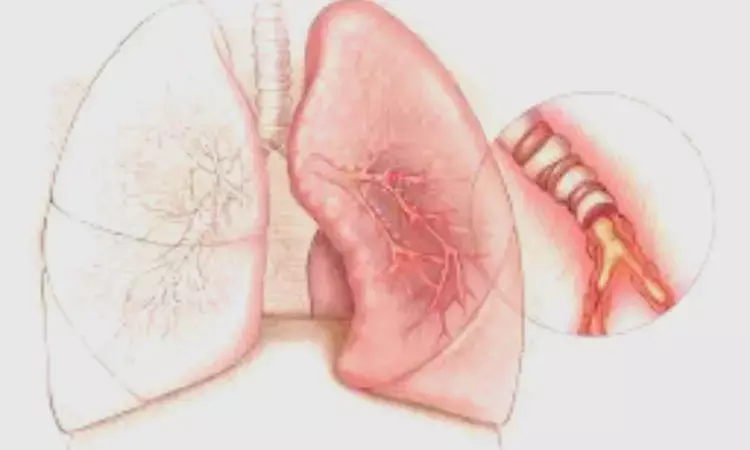- Home
- Medical news & Guidelines
- Anesthesiology
- Cardiology and CTVS
- Critical Care
- Dentistry
- Dermatology
- Diabetes and Endocrinology
- ENT
- Gastroenterology
- Medicine
- Nephrology
- Neurology
- Obstretics-Gynaecology
- Oncology
- Ophthalmology
- Orthopaedics
- Pediatrics-Neonatology
- Psychiatry
- Pulmonology
- Radiology
- Surgery
- Urology
- Laboratory Medicine
- Diet
- Nursing
- Paramedical
- Physiotherapy
- Health news
- Fact Check
- Bone Health Fact Check
- Brain Health Fact Check
- Cancer Related Fact Check
- Child Care Fact Check
- Dental and oral health fact check
- Diabetes and metabolic health fact check
- Diet and Nutrition Fact Check
- Eye and ENT Care Fact Check
- Fitness fact check
- Gut health fact check
- Heart health fact check
- Kidney health fact check
- Medical education fact check
- Men's health fact check
- Respiratory fact check
- Skin and hair care fact check
- Vaccine and Immunization fact check
- Women's health fact check
- AYUSH
- State News
- Andaman and Nicobar Islands
- Andhra Pradesh
- Arunachal Pradesh
- Assam
- Bihar
- Chandigarh
- Chattisgarh
- Dadra and Nagar Haveli
- Daman and Diu
- Delhi
- Goa
- Gujarat
- Haryana
- Himachal Pradesh
- Jammu & Kashmir
- Jharkhand
- Karnataka
- Kerala
- Ladakh
- Lakshadweep
- Madhya Pradesh
- Maharashtra
- Manipur
- Meghalaya
- Mizoram
- Nagaland
- Odisha
- Puducherry
- Punjab
- Rajasthan
- Sikkim
- Tamil Nadu
- Telangana
- Tripura
- Uttar Pradesh
- Uttrakhand
- West Bengal
- Medical Education
- Industry
Tezepelumab and dupilumab effective at reducing asthma exacerbations in patients with eosinophilia

Ontario: New trial from Ontario revealed that biologics like Tezepelumab and dupiliumab can successfully reduce exacerbations in asthma patients by improving lung function. The trial results were published in the journal Annals of Allergy, Asthma & Immunology.
Asthma is a respiratory condition that is associated with significant morbidity. Asthma that is inadequately controlled by high-dose inhaled corticosteroids and long-acting β2-agonists or oral corticosteroids may have an advantage from using biologics. Though there is data on the use of biologics for asthma, no trial has directly compared biologics to manage uncontrolled asthma. Hence Tyler Pitre et al from Ontario, Canada have conducted a trial to compare the relative efficacy of biologics in asthma.
Randomized trials that addressed biologic therapies were included from inception to May 31, 2022. The researchers independently screened references, extracted data, and assessed the risk of bias. A frequentist network meta-analysis was performed, and certainty of evidence was assessed using the GRADE approach. Dichotomous outcomes were presented as absolute risk differences per 1000 patients and relative risk (RR) with 95% confidence intervals (95% CI) and continuous outcomes were presented as mean difference (MD) and 95% CI.
Key findings of the study:
- 64 trials, including 26,630 patients were included.
- Tezepelumab showed 329 fewer exacerbations per 1000 and dupilumab showed 319.6 fewer exacerbations per 1000 compared to the placebo (high certainty) in patients with eosinophilic asthma.
- Tezepelumab (MD 0.24 L) and dupilumab (0.25 L) improved lung function (FEV1) compared to the placebo with high certainty.
- When compared to placebo both Tezepelumab (110.97 fewer hospital admissions per 1000) and dupilumab (97.27 fewer hospitalizations) reduced hospital admissions with moderate certainty.
- Biologics could not improve asthma outcomes in low eosinophilic patients.
- Tezepelumab (MD 0.1 L) and dupilumab (MD 0.1 L) improved lung function with low certainty for the low eosinophilic patients.
Thus, though all available biologics are effective at reducing exacerbations, Tezepelumab and dupiliumab reduce exacerbations by improving lung function as compared to other available treatments.
BDS, MDS
Dr.Niharika Harsha B (BDS,MDS) completed her BDS from Govt Dental College, Hyderabad and MDS from Dr.NTR University of health sciences(Now Kaloji Rao University). She has 4 years of private dental practice and worked for 2 years as Consultant Oral Radiologist at a Dental Imaging Centre in Hyderabad. She worked as Research Assistant and scientific writer in the development of Oral Anti cancer screening device with her seniors. She has a deep intriguing wish in writing highly engaging, captivating and informative medical content for a wider audience. She can be contacted at editorial@medicaldialogues.in.
Dr Kamal Kant Kohli-MBBS, DTCD- a chest specialist with more than 30 years of practice and a flair for writing clinical articles, Dr Kamal Kant Kohli joined Medical Dialogues as a Chief Editor of Medical News. Besides writing articles, as an editor, he proofreads and verifies all the medical content published on Medical Dialogues including those coming from journals, studies,medical conferences,guidelines etc. Email: drkohli@medicaldialogues.in. Contact no. 011-43720751




